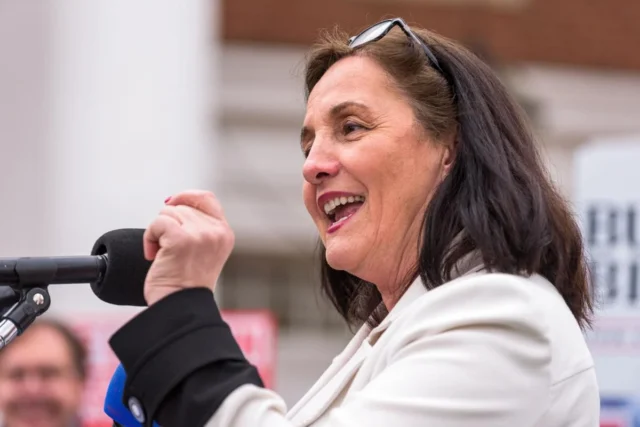By Ruben Avxhiu
Buta Biberaj was only 3 year old when her family crossed the pond and immigrated to the United States. The Biberajs had risked their lives to escape the communist regime in Albania and after a few years in Yugoslavia had joined many other Albanian families in their quest for a new life in the “New World”.
Like many first- and second-generation Albanian-Americans, Buta grew up between two worlds and two cultures, combining the strong values of the Albanian heritage to the expectations and the possibilities of an everchanging America.
Her life in New York forged her character and inspired her interest in justice and in defense of the underprivileged.
Thirty years ago, she became probably the first Albanian lawyer to found her own practice and in the following years served also “as a substitute judge for over 11 years and a guardian ad litem for over 23 years.”
“I was able to see the criminal justice system from various perspectives,” she says in this interview with Illyria newspaper in which she speaks about her family and her professional journey.
In 2019, she ran for office and became “the first woman elected, the first immigrant (Albanian American) and the first Muslim to serve as the Commonwealth’s Attorney for Loudoun County.”
It hasn’t been an easy ride in a climate when political and social issues have dominated over legal matters in unprecedented ways in the American history. Despite the challenges, Buta Biberaj is proud of her achievements and is seeking a second term to finish the job that she has started.
She has also a few messages for young Albanian-Americans who are eyeing a legal career or public services.
INTERVIEW
Would you kindly offer some family background for our readers? Where is your family from and why did they move to the United States?
Both of my parents escaped from Albania and into Yugoslavia (now Montenegro). I recall my father sharing with us how he and his parents and siblings planned to escape from Albania (after WWII) to escape Communism and to protect their families. They chose to leave together en masse and enter Yugoslavia through the dense forestry in the mountainous regions. They were detected by the Albanians and the soldiers started shooting in their general direction. The Yugoslavian military was shooting at them from the other side. Here they were caught amid both sides shooting at them as they entered Yugoslavia. They were fortunate that all their family survived the journey and entered Yugoslavia. There they had 7 children and lived the common life of farmers – working the land to provide for their family.
My father was always a visionary. As most farmers, my father had a limited education (7th grade level) he was enamored with the world. He was always interested in the United States and the promises it held – freedom and liberty. In the 1960’s he befriended a Priest with the Roman Catholic Church. They frequently discussed the wonder of America. In the late 1960’s, the Priest contacted my father and informed him that there was an opportunity to emigrate to the United States. That the Catholic Church in Rome was sponsoring families to emigrate to America. My parents bravely made the decision to participate in the program and received permission to go to Rome and then arrive in New York City in 1967.
So, you were not born in the United States. What are some of the first memories of arriving in the new country? Any recollection from the first day? How was the early new life here?
I was born in Montenegro in 1964. In 1967, I was 3 years old when my parents and 6 of my siblings traveled to the Bronx, New York. In 1970, the 8 child was born. One of my earliest memories is leaving (either Yugoslavia or Italy (I can’t recall which)) to go to the United States and having to say good-bye to my cousins. I recall crying and being sad. I don’t recall my first day in the U.S. but do remember us living in an apartment in the Bronx. Now that I recall the specifics, I remember that the apartment did not have any windows with natural light. This makes me think that this was space that we were permitted to live in temporarily while we found a “legal apartment” / with windows.
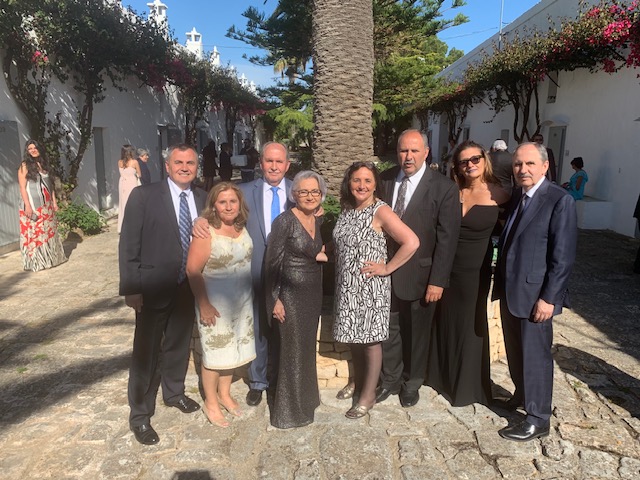
Many young immigrants grow up between two cultures, which is often a great asset but also a source of contradictions and difficulties? What was your personal experience?
Growing up Albanian in New York City came with a lot of conflict and contradictions. As a young person, you strive to fit it and acclimate to your community and its customs. As an immigrant, especially an Albanian, you struggle to conform to the culture of your heritage. The conflict was constant. It permeated language, food, dress and behavior. Our parents insisted that we speak Albanian in the home. This mandate was the very reason how we were able to maintain our ability to speak Albanian. However, it was challenging to try and master two languages. In the end, it was a blessing because we were able to benefit from being multi-lingual. Eating traditional Albanian food has been a journey; as a young person, I craved “American” food. Now as an adult, I crave “Albanian” food. 😊 Trying to assimilate our dress to fit in with our American friends was always challenging. And, remembering that we are “Albanian” and to act accordingly, was a push and pull.
This struggle for balance was toughest during my school years. It was during my college days that I learned to see it as a blessing to be part of two cultures. I remember living in Virginia and being in the driveway. I recall it being a trying day and I was struggling with “fitting in” with both worlds. My father came up to me and asked, “what’s going on?” I feigned and responded “nothing.” He pursued the conversation until I finally said “I don’t know where I fit in – I am not Albanian and, I am not American. I don’t fit in either one.” My dad very wisely responded “why do you feel the need to be one or the other. Both are good. Take from each the positive and make it yours. You can be both Albanian and American. You can choose to be the best that each has to offer.” I remember feeling as if the weight of the world was removed from my shoulders. I was given a license to be free to be me. Since then, I have tried to embrace the best of being Albanian and American.
How much role did the Albanian origin and background play in your formation?
Growing up Albanian in New York meant that we were part of a large Albanian community that included a lot of family. There were many events that brought us together and allowed us to learn about our Albanian culture. One of the most impactful lessons was learning and living with the premise that our word was everything. My dad would routinely state, “regardless of where you go or what title you attain, your word is your everything.” That was also around the time that the phrase “word is law” was common amongst my peers. That phrase became emblazoned in my mind and in my actions.
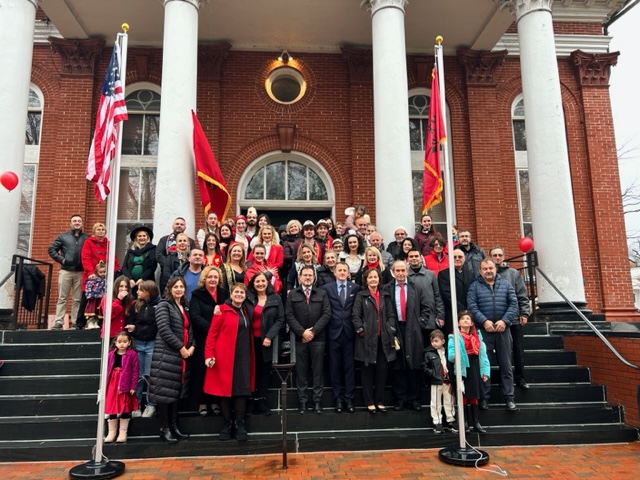
Can you tell us about your journey from Albania to becoming the first female Commonwealth’s Attorney for Loudoun County?
My parents were fortunate to find jobs in the cleaning industry working for Seagrams 7 in Manhattan. They worked evenings during the week thus leaving my teen-ages brother and sister responsible for taking care of the kids. We were fortunate that my parents focused on education and recognized that it was a great equalizer and prioritized good grades. While living in NYC, we lived in the projects of the South Bronx. Our neighborhood was predominantly black and immigrant. I was fortunate to get good grades in school and was able to attend Fordham University for my freshman and first half of sophomore years.
My parents elected to move to Virginia where a couple of my brothers lived. They informed me of a college, George Mason University. I transferred to George Mason University and received my Bachelor’s of Science in Education. I taught elementary school and worked a second full-time job at Costco for three years before attending the George Mason University School of Law. I continued to work full-time at Costco while attending law school. I passed the New York and Virginia state bars in 1993. I opened my law practice immediately out of law school. From 1993 to 2019, I was the managing partner of Biberaj Snow & Sinclair, PC – a general practice firm in Leesburg, Virginia. During this time, I served as a substitute judge for over 11 years and a guardian ad litem for over 23 years. I was able to see the criminal justice system from various perspectives. It was clear that the criminal justice system was just for some, and not for all. I saw how people from marginalized communities, communities of color, the impoverished, immigrants, and the less educated suffered the greatest consequences from being involved in the justice system, both as a victim or an accused.
In 2018, there was a case in the local court where a black man in his 40s was caught stealing tires from 6 cars. The prosecution charged him with 18 felonies and argued to the jury that his prior criminal record of convictions of drug possession and theft was indicative that they needed to send him a message that would convince him to stop committing crimes. The jury recommended 127 years. The judge ended up imposing 17 years of active incarceration. I saw that as being inhuman and unwise because it did not solve the problem of his drug addiction. This was indicative of how the prosecutors meted out justice. They did not solve problems, they simple processed paper and did not acknowledge that how they made decisions was actually causing the community greater harm – recidivism.
I ran in 2019 and became the first woman elected, the first immigrant (Albanian American) and the first Muslim to serve as the Commonwealth’s Attorney for Loudoun County.
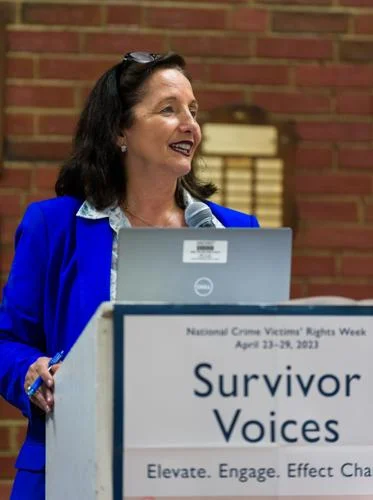
I could be wrong, but I think you are the first ever Albanian-American woman to become the elected Commonwealth’s Attorney (District Attorney). What made you choose to study law and then become a defense attorney?
I believe I am the first ever Albanian-American woman elected to become the Commonwealth’s Attorney. I am honored and humbled by this opportunity.
Growing up in NYC, I saw a lot of inequity – financial, social and educational. Some of it was because we were immigrants, part of it was opportunity – education was not readily available for all (the children were expected to get jobs and forego education so that they could contribute financially to the family). Also, the 70’s and 80’s were quite turbulent in NY. I remember watching L.A. Law and being impressed by attorney Victor Sifuentes, the criminal defense attorney on the show. He always represented clients that were wrongfully accused; he was a champion for the people – those who could not protect themselves, those who did not appear to be seen or heard.
Being in communities where many felt that they were not seen or heard, I wanted to be a champion for them and there was nothing more important to me than justice. Protecting those that were wrongfully accused or those who were marginalized became my mission and my journey. I felt that was how I could repay for the help my family and I received when we came to the states – help in emigrating, help with housing, my parents getting jobs although they did not speak English or have a trade, help with getting an education, and help being a successful Albanian-Americans.
What are some of the cases that make you most proud in your long work that spans three decades in defense of clients and in service of justice?
During my first year as the Commonwealth’s Attorney, I took over the sentencing of a sexual assault case. The victim was an adult with special needs. My perception was that the defense was expecting the victim to not be able to testify to the impact of the crime. I met with the parents and the victim several times and established a rapport which made it possible for her to testify at the sentencing hearing and have her voice heard. As she testified, she was able to show the court how egregious the defendant’s actions were because he chose to victimize a very vulnerable person. And, that he stole her innocence and her ability to trust people. She and her parents were able to be part of a process that allowed her and them to start healing and moving forward.
While in private practice, I represented parents whose children were removed from them based on allegations of abuse or neglect or kids who were subjects of alleged abuse or neglect. Most of the parents were caught in the dire straits of poverty. They were not able to provide the level of care that is expected of middle-class families with means. I represented 5 kids in one family. Three of them were special needs. The family was living in a hotel and ran out of money – the children’s social security benefits could not meet their monthly expenses. The parents went to the kids’ schools and informed them that they needed to move out of the hotel. The schools contacted child protective services. The social workers set up a meeting with the parents under the guise that they were going to provide them with services while the children were picked up from the hotel and removed from the care of their parents. The county removed all 5 kids and placed them in individual foster care homes. I spent the next year ensuring that the kids had family visitation, services, and were reunited with their family. I felt the greatest satisfaction in being able to reunite a family that was separated because of poverty, and educating a social services to reimagine safe families to include those who were different than them.
As a defense attorney, I represented a client who was charged with aggravated malicious wounding. We were able to find witnesses who saw the incident and supported our version of the facts that showed my client was protecting another person who was being beaten with a baseball bat. The prosecutor refused to release my client or listen to the witnesses because she “could not resolve the case because the police charged it and she had to do what the police said.” It took us over one year, during which time he was incarcerated, for the prosecutor to finally accept the fact that they were prosecuting him wrongfully. Rather than dropping the charges and releasing my client, the prosecutor reduced the felony to a misdemeanor with time served. Although we were confident that we could prevail at trial, my client accepted the plea to ensure that he would be released. The success of this case rested on our unwillingness to accept the version of the events as investigated and reported by the police. We did the work and went into the community to find the truth and were able to save my client from decades of imprisonment from a wrongful conviction.
You are probably also the first Albanian-American Defense Attorney. (We’ll see if someone will fact-check this but I think it is right). This is a challenging time with many issues going beyond the realm of law and involving politics and cultural issues in unprecedented ways. Public service can benefit tremendously from elected officials who come from private practices, but what has been the experience from your perspective?
I don’t know if I am the first Albanian-American defense attorney – woman or otherwise.
I agree that there is a great benefit for a person to come from private practice and into the realm of public service. Coming from the private sector is a different perspective on how to address problems and solutions. In the private sector there is a premium to solving problems and being innovative. Whereas there is an expectation in the public sector that the status quo is acceptable.
When I transitioned from my private practice to being the Commonwealth’s Attorney I expected that I could bring my business experience to the office and run it more efficiently. I was not prepared for the inefficiencies resulting from the bureaucratic policies. I had to and still have to advocate for resources that are necessary to do the best job for our community. I was naïve and believed that the politics were an issue during the election, and after the election that I would be able to do the job that I was elected to do. Not quite the reality of my experience.
I was elected in 2019, and assumed the position on January 1, 2020. Within 3 months, we had to deal with the pandemic. My promise to the community was that I would change the culture in the office. To do so, I was changing the staff and the practices. With the pandemic, it became challenging to do the things we planned as we were invested in keeping the court system afloat.
Along with the pandemic, came the animosity associated with divisive politics and the cancel culture. This created much distraction from the mission and the ability to create collaborations amongst the stakeholders. We are hopeful to restart that process now that the pandemic is under control.
How does your unique perspective influence the Criminal Justice System in Loudoun County?
Growing up in NYC exposed me to diversity of culture and experience. This allowed me to have the unique perspective to recognize the importance of seeing a person’s potential – to look beyond their circumstance and see their potential for success. As we know, opportunity dictates journey. Creating alternative dispositions provides an opportunity for someone to be compliant with the law – we don’t need to break everyone who breaks the law. WE have to understand what happened that formed the decision and what do we need to put in place to keep the community safe and to provide the services so the person does not recommit the crime.
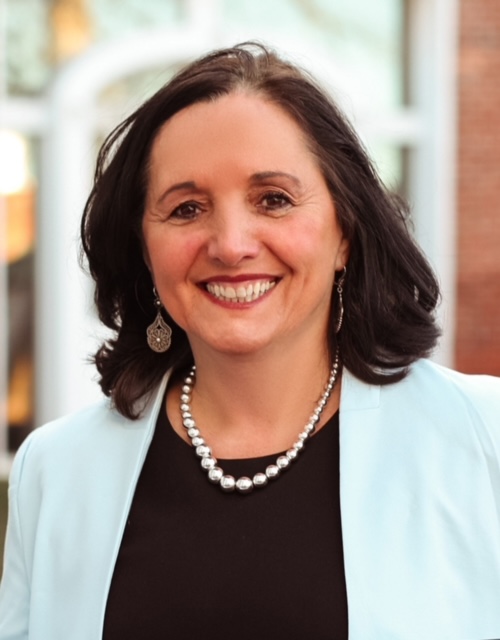
What key accomplishments from your first term are you most proud of?
I was able to build a bigger team for our victim witness case managers – we increased from 4 to 7; and, we increased our domestic violence and sexual assault prosecutor team from 2 to 6 attorneys. As we increased our resources and focused on the most egregious crimes, we also focused on the incarceration process. Traditionally, it was common for the prosecutors and the courts to hold someone in jail even if they were charged with a non-violent, low-level offense. This incarceration created instability for our community – the person may have lost their job, lost the income to house his family, lost the income to feed his family, and destabilized the children. We focused on following the law which indicated that the person should be released pre-trial unless they were an unreasonable risk of flight or unreasonable risk to themselves or the community. This application resulted in a decrease in the daily jail population from 425 to less than 250, without an increase in recidivism. The violent crime rate decreased 12% in Loudoun, while there was a 7 % increase in Virginia in 2021, and a 31% decrease in violent crimes since 2019.
How have your Albanian roots and diverse educational background informed your role as Commonwealth’s Attorney?
Being of Albanian parentage, we were taught to be strong in our convictions and character. We stand for what is just and don’t fold because it is tough. We are emboldened when we are able to be a champion for others. Adding to this a diverse educational background makes us more formidable. We embrace the power of education with the compassion of humanity. This is a combination that makes for a better Commonwealth’s Attorney because you are constantly seeking solutions on how to keep the community safe while we achieve justice.
In the upcoming re-election, what are your primary goals for your potential second term?
Keep building the victim services team, create a domestic violence interruption program, and develop community education programs on how to address the intersectionality between mental health and criminal activity.
What is your vision for the second term as a District Attorney?
For my next term, I will focus on building up our victim witness services and our litigation team to focus on elder abuse and violent crimes. Additionally, I will work with non-profits and universities to create a data base that tracks our cases and how we resolve them (demographics, charges, and sentences).
What advice do you have for Albanian-Americans or immigrants interested in pursuing careers in public service or law?
Do it! A career in law is all encompassing and consuming. It is challenging and rewarding. As a lawyer, you are blessed with the opportunity to be a champion for the voice-less. As an immigrant, we love freedom and unity for our community. As a lawyer, you are given the opportunity to endeavor for both.
What message would you like to share with the Albanian-American community, in light of your experiences and accomplishments?
Be proud of your heritage. It is a blessing to live in America. Coming from a different culture, we bring a lot to every table we join. With the history of our people, we know how it is to be marginalized, to work hard and to achieve success. When we do so, we should always reach back and pull someone up with us. That is conviction and culture.
What can the Albanian-American in your district do to help you? How can they contribute?
I always appreciate the support of our Albanian-American community. Support can be shown by making a contribution, and signing up to volunteer to canvass, phone bank, and post our signs. This can be done from our campaign website – www.BiberajForLoudoun.com. Thank you for your interest and assistance.
